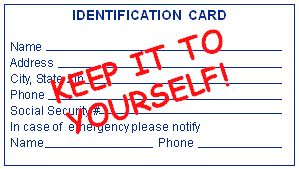|
Identity Thieves Can Ruin Your Good Name
Here’s how to guard against it: Before revealing personal identifying information, find out how it will be used and if it will be shared with others. Ask if you have a choice about the use of your information: can you choose to have it kept confidential? Pay attention to your billing cycles. Follow up with creditors if bills do not arrive on time. Give your Social Security number only when absolutely necessary. Ask to use other types of identifiers when possible. Minimize the identification information and the number of cards you carry to what you actually need. If your I.D. or credit cards are lost or stolen, notify the creditors by phone immediately, and call the credit bureaus to ask that a "fraud alert" be placed in your file. Order a copy of your credit report from the three credit reporting agencies every year. Make sure it’s accurate and includes only those activities you’ve authorized. Keep items with personal information in a safe place; tear them up when you don’t need them anymore. Make sure charge receipts, copies of credit applications, insurance forms, bank checks and statements, expired charge cards, and credit offers you get in the mail are disposed of appropriately. For More Information If you've been a victim of identity theft, file a complaint with the FTC by contacting the FTC's Identity Theft Hotline by telephone: toll-free 1-877-IDTHEFT (438-4338); TDD: 202-326-2502; by mail: Identity Theft Clearinghouse, Federal Trade Commission, 600 Pennsylvania Avenue, NW, Washington, DC 20580; or online: https://www.ftc.gov/ftc/idtheftform.htm. The FTC publishes free brochures on many consumer issues. For a complete list of publications, write for Best Sellers, Consumer Response Center, Federal Trade Commission, 600 Pennsylvania Ave, NW, Washington, DC 20580; or call toll-free 1-877-FTC-HELP (382-4357), TDD 202-326-2502. |
